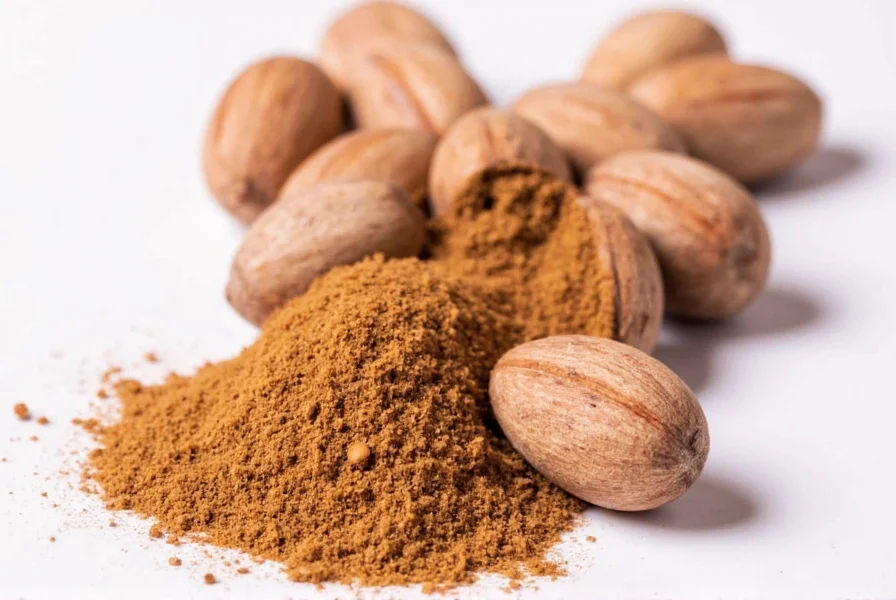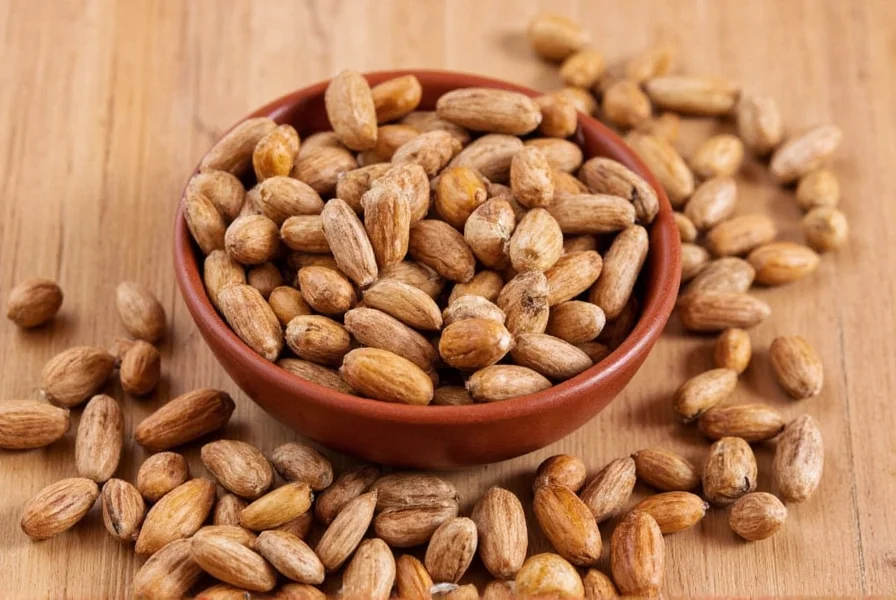Nutmeg, the seed of the Myristica fragrans tree, has been valued for centuries not just as a culinary spice but for its potential health-promoting properties. This aromatic spice contains numerous bioactive compounds that contribute to its therapeutic potential, though modern research is still uncovering the full extent of its benefits.
What Makes Nutmeg Nutritionally Unique
Beyond its warm, distinctive flavor, nutmeg contains a complex profile of beneficial compounds. The primary active components include myristicin, elemicin, and safrole, along with significant amounts of minerals and vitamins. Unlike many spices that offer primarily antioxidant benefits, nutmeg's compounds interact with multiple physiological systems.
| Nutrient | Amount per Teaspoon (2g) | % Daily Value |
|---|---|---|
| Calories | 12 | 1% |
| Fiber | 1g | 4% |
| Magnesium | 20mg | 5% |
| Copper | 0.1mg | 11% |
| Manganese | 0.1mg | 4% |
Scientifically Supported Health Benefits of Nutmeg
Anti-Inflammatory Properties
Multiple studies indicate nutmeg contains compounds that may help reduce inflammation. Research published in the Journal of Agricultural and Food Chemistry found that nutmeg extract significantly inhibited inflammatory markers in laboratory tests. The lignans and phenolic compounds in nutmeg appear to modulate inflammatory pathways, potentially benefiting those with chronic inflammatory conditions. When considering nutmeg anti-inflammatory properties for natural inflammation management, it works best as part of a comprehensive approach rather than a standalone solution.
Digestive Health Support
Traditional medicine systems have long used nutmeg for digestive issues, and modern science is beginning to validate these uses. The spice stimulates digestive enzyme production and may help reduce intestinal spasms. A 2018 study in Food Science & Nutrition demonstrated that nutmeg extract improved gut motility in test subjects. For those exploring health benefits of nutmeg for digestion, incorporating small amounts into meals may support healthy digestion without the side effects of stronger pharmaceutical options.

Sleep and Anxiety Reduction
Nutmeg contains myristicin and elemicin, compounds that may have mild sedative effects. While not as potent as dedicated sleep aids, research suggests these compounds interact with neurotransmitter systems involved in sleep regulation. A cup of warm milk with a pinch of nutmeg has been a traditional remedy for insomnia across many cultures. Those investigating nutmeg for sleep improvement should note that effects are subtle and work best when combined with good sleep hygiene practices.
Pain Relief Potential
Studies indicate nutmeg may have analgesic properties. Research in the Journal of Ethnopharmacology found that nutmeg extract reduced pain responses in laboratory models, potentially through interaction with opioid receptors. The anti-inflammatory effects also contribute to pain reduction, particularly for joint discomfort. This makes nutmeg worth considering as part of a natural approach to managing occasional discomfort with nutmeg.
Antioxidant Capacity
Nutmeg ranks highly among spices for antioxidant activity. Its phenolic compounds effectively neutralize free radicals, potentially reducing oxidative stress throughout the body. A comparative analysis in Antioxidants journal placed nutmeg among the top ten spices for ORAC (Oxygen Radical Absorbance Capacity) values. Regular consumption of nutritional value of ground nutmeg as part of a varied diet contributes to overall antioxidant intake.
Safe Consumption Guidelines
While nutmeg offers potential benefits, proper dosage is critical. The safe daily amount for adults is generally considered to be 1/4 to 1/2 teaspoon (about 1-2 grams) of ground nutmeg. Higher doses can cause adverse effects due to myristicin content.
| Consumption Level | Effects | Recommendation |
|---|---|---|
| 1/4-1/2 tsp daily | Therapeutic benefits without side effects | Safe for regular consumption |
| 1-2 teaspoons | Potential mild side effects (dizziness, nausea) | Avoid regular consumption |
| 2+ tablespoons | Severe side effects (tachycardia, hallucinations) | Medical attention required |
Practical Ways to Incorporate Nutmeg
To maximize nutmeg health benefits without side effects, consider these practical applications:
- Add freshly grated nutmeg to morning oatmeal or smoothies
- Include in warm beverages like golden milk or herbal teas
- Use in savory dishes like roasted vegetables, soups, and stews
- Combine with other beneficial spices like cinnamon and ginger
- Store whole nutmeg seeds and grate as needed for maximum potency

Important Safety Considerations
Nutmeg should be avoided or used with extreme caution in certain populations:
- Pregnant and breastfeeding women should limit intake to culinary amounts only
- Individuals taking sedative medications should consult a healthcare provider
- Those with liver conditions should exercise caution due to metabolic processing
- Never consume nutmeg oil internally without professional guidance
When determining how much nutmeg is safe to consume daily, remember that more is not better. The therapeutic window is narrow, and excessive consumption can lead to nutmeg poisoning with symptoms including rapid heartbeat, nausea, dizziness, and in severe cases, hallucinations.
Nutmeg in Context: Comparing to Other Spices
While nutmeg offers unique benefits, it works best as part of a diverse spice regimen. Unlike turmeric (which excels in anti-inflammatory properties) or ginger (superior for digestion), nutmeg provides a different profile of bioactive compounds. The nutmeg versus mace health benefits comparison is particularly interesting since mace comes from the same plant but has a slightly different compound profile, making them complementary rather than competitive.
Conclusion: Balanced Perspective on Nutmeg Benefits
Nutmeg represents a valuable addition to a health-conscious diet when used appropriately. The most compelling evidence supports its anti-inflammatory and digestive benefits, while research continues on other potential applications. As with any natural remedy, manage expectations—nutmeg is not a miracle cure but rather a supportive element in an overall healthy lifestyle. Those seeking scientific studies on nutmeg benefits should look for recent peer-reviewed research while recognizing that many traditional uses haven't yet been thoroughly validated by modern science.
Frequently Asked Questions
What are the main health benefits of nutmeg supported by research?
Research primarily supports nutmeg's anti-inflammatory properties, digestive benefits, and potential for improving sleep quality. Studies show its compounds like myristicin and lignans help reduce inflammation markers, stimulate digestive enzymes, and may interact with neurotransmitter systems involved in sleep regulation. The most well-documented benefits relate to moderate culinary use rather than therapeutic doses.
How much nutmeg is safe to consume daily for health benefits?
The safe daily amount of nutmeg for adults is 1/4 to 1/2 teaspoon (approximately 1-2 grams) of ground nutmeg. This amount provides potential health benefits without risk of adverse effects. Consuming more than 1 teaspoon daily may cause side effects, and amounts exceeding 2 tablespoons can lead to serious health issues including rapid heartbeat, nausea, and hallucinations. Always start with smaller amounts to assess individual tolerance.
Can nutmeg help with sleep problems and anxiety?
Nutmeg contains compounds like myristicin and elemicin that may have mild sedative effects. While not as potent as dedicated sleep medications, a small amount (1/8-1/4 teaspoon) in warm milk before bed has been traditionally used to support relaxation and sleep. Research suggests these compounds interact with neurotransmitter systems involved in sleep regulation, but effects are subtle and work best as part of good sleep hygiene practices rather than a standalone solution for serious sleep disorders.
What are the potential side effects of consuming too much nutmeg?
Excessive nutmeg consumption (typically more than 1-2 teaspoons) can cause side effects including dizziness, nausea, dry mouth, rapid heartbeat, and in severe cases, hallucinations or delirium. These effects are primarily due to myristicin content and can last 24-48 hours. Long-term excessive use may potentially affect liver function. The effects are dose-dependent, and culinary amounts (1/4 teaspoon or less) are generally considered safe for most adults.
How does fresh grated nutmeg compare to pre-ground nutmeg for health benefits?
Freshly grated nutmeg generally offers superior health benefits compared to pre-ground varieties. The volatile compounds responsible for many of nutmeg's therapeutic effects degrade over time when exposed to air. Whole nutmeg seeds retain their potency for up to two years, while pre-ground nutmeg loses significant bioactive compounds within 6-12 months. For maximum nutmeg health benefits without side effects, store whole seeds in an airtight container and grate as needed using a fine microplane grater.











 浙公网安备
33010002000092号
浙公网安备
33010002000092号 浙B2-20120091-4
浙B2-20120091-4